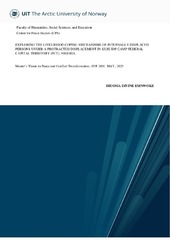EXPLORING THE LIVELIHOOD COPING MECHANISMS OF INTERNALLY DISPLACED PERSONS UNDER A PROTRACTED DISPLACEMENT IN KUJE IDP CAMP FEDERAL CAPITAL TERRITORY (FCT), NIGERIA.
Forfatter
Esinwoke, Ihuoma DivineSammendrag
ABSTRACT
This thesis is relevant research that explored the livelihood coping mechanisms of Internally Displaced Persons (IDPs) in Nigeria, a country that has witnessed prolonged displacements due to insurgency, conflict, kidnapping for ransom, banditry, and other factors was chosen for this research. Using a qualitative research approach of Sustainable Livelihood framework, the study explores the various coping mechanisms that IDPs living in the Kuje Camp located in peri-urban area in Abuja, the Federal Capital Territory (FCT) of Nigeria, use to sustain their livelihoods. Primary data were collected through in-depth interviews, observation, and focus group discussions with thirty IDP households, revealing the complex nature of their coping mechanisms. The findings also highlight the significant role of community support and external assistance from NGOs and government agencies. The research emphasizes the strategies adopted by IDPs for their day-to-day survival, as well as identifying the challenges they face. The study also revealed that some national and international NGOs, in addition to the Nigerian government agencies, were helping or had helped the IDPs to support themselves in making a living. These assistance programs were mostly focused on the following: financial and vocational training, free medical care, mental health and psychosocial support, self-awareness, and good personal hygiene. But even with the given supports and assistance, the research indicates that these IDPs circumstances and conditions are still not good, despite their resilience to make a living for themselves and that of their families in the new environment they found themselves. This study contributes to a better understanding of the socio-economic dynamics of IDPs in Nigeria. It offers recommendations for improving the livelihood of IDPs and enhancing humanitarian interventions. By shedding light on the experiences of IDPs, the research aims to contribute to raising awareness of the complexities surrounding internal displacement in Nigeria and the Northen region of Nigeria in particular.
KEYWORDS: Nigeria, IDPs, Livelihood, displacement, mechanisms, household, humanitarianism. ABSTRACT
This thesis is relevant research that explored the livelihood coping mechanisms of Internally Displaced Persons (IDPs) in Nigeria, a country that has witnessed prolonged displacements due to insurgency, conflict, kidnapping for ransom, banditry, and other factors was chosen for this research. Using a qualitative research approach of Sustainable Livelihood framework, the study explores the various coping mechanisms that IDPs living in the Kuje Camp located in peri-urban area in Abuja, the Federal Capital Territory (FCT) of Nigeria, use to sustain their livelihoods. Primary data were collected through in-depth interviews, observation, and focus group discussions with thirty IDP households, revealing the complex nature of their coping mechanisms. The findings also highlight the significant role of community support and external assistance from NGOs and government agencies. The research emphasizes the strategies adopted by IDPs for their day-to-day survival, as well as identifying the challenges they face. The study also revealed that some national and international NGOs, in addition to the Nigerian government agencies, were helping or had helped the IDPs to support themselves in making a living. These assistance programs were mostly focused on the following: financial and vocational training, free medical care, mental health and psychosocial support, self-awareness, and good personal hygiene. But even with the given supports and assistance, the research indicates that these IDPs circumstances and conditions are still not good, despite their resilience to make a living for themselves and that of their families in the new environment they found themselves. This study contributes to a better understanding of the socio-economic dynamics of IDPs in Nigeria. It offers recommendations for improving the livelihood of IDPs and enhancing humanitarian interventions. By shedding light on the experiences of IDPs, the research aims to contribute to raising awareness of the complexities surrounding internal displacement in Nigeria and the Northen region of Nigeria in particular.
KEYWORDS: Nigeria, IDPs, Livelihood, displacement, mechanisms, household, humanitarianism.
Forlag
UiT The Arctic University of NorwayMetadata
Vis full innførselSamlinger
Copyright 2025 The Author(s)


 English
English norsk
norsk
